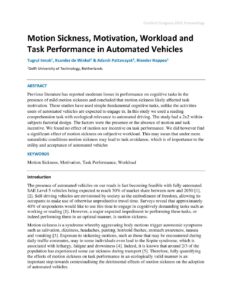Keywords
- Accessibility (9)
- Accimaps (7)
- Aerospace (2)
- Agriculture & forestry (4)
- Anthropometry (17)
- Artificial intelligence (20)
- Augmented reality (3)
- Automation (21)
- Automotive (40)
- Autonomous systems (9)
- Autonomous vehicles (28)
- Aviation (75)
- Behaviour (18)
- Climate change (13)
- Clothing (5)
- Cognition (21)
- Comfort (41)
- Comfort Congress 2021 (39)
- Communication (15)
- Complex systems (6)
- Construction (11)
- Contemporary EHF 2016 (80)
- Contemporary EHF 2017 (42)
- Contemporary EHF 2018 (37)
- Contemporary EHF 2019 (53)
- Contemporary EHF 2020 (84)
- Contemporary EHF 2021 (41)
- Contemporary EHF 2022 (77)
- Contemporary EHF 2023 (73)
- Contemporary EHF 2024 (105)
- Cybersecurity (7)
- Data (11)
- Decision making (21)
- Defence (35)
- Design (60)
- Education, training & skills (19)
- Emergency services (7)
- Energy (7)
- Equality, diversity & inclusion (EDI) (11)
- Ergonomics (7)
- Fatigue & sleep (20)
- Health & Safety (9)
- Healthcare (122)
- Human factors integration (39)
- Human performance (21)
- Human-machine interaction (21)
- Incidents (25)
- Interface design (22)
- Investigation (25)
- Leadership (11)
- Linguistics (1)
- Manufacturing (15)
- Maritime (15)
- Mental health & wellbeing (25)
- Mining (1)
- Musculoskeletal (14)
- Non-technical skills (8)
- Nuclear (6)
- Occupational health (7)
- Office ergonomics (6)
- Organisational design (7)
- Pandemic (14)
- Patient Safety (23)
- Perception (14)
- Pharmaceutical (4)
- Psychology (9)
- Publications (633)
- Rail (57)
- Resilience (13)
- Risk assessment (24)
- Road safety (16)
- Safety (67)
- Safety culture (17)
- Seating (16)
- SEIPS (7)
- Simulation (19)
- Situation awareness (19)
- Sociotechnical systems (19)
- Sport & leisure (6)
- Submarines (11)
- Systems (68)
- Task analysis (16)
- Teamwork (9)
- Technology (71)
- Tools & techniques (31)
- Transportation (25)
- Usability (25)
- User centred design (12)
- User experience (16)
- Veterinary (2)
- Virtual reality (10)
- Workload (28)
- Workplace Design (1)

